Suchergebnisse
Monitoring Mehrfamilienhäuser "Tonpfeifengasse"
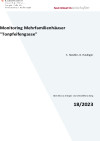
Messtechnische Begleitung und Bewertung der Funktionsweise von Bauteilaktivierung als Speicher für Umweltenergien am Beispiel der Wohnhausanlage Tonpfeiffengasse.
Schriftenreihe
18/2023
S. Handler, G. Haslinger
Herausgeber: BMK
Deutsch, 72 Seiten
Downloads zur Publikation
Innovative Konzepte zur Versorgung großvolumiger städtischer Gebäude/Quartiere mit PV und Geothermie
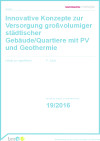
Schriftenreihe
19/2016
F. Zach
Herausgeber: BMVIT
Deutsch, 83 Seiten
Downloads zur Publikation
Digital transformation of the Austrian construction industry and its impact on employment
What are the impacts of the digital transformation of the Austrian construction industry on this sector’s labour market? By looking at the next five to ten years it will be analysed whether and to what extent digital applications lead to an increasing, falling or stagnant demand for employees in the construction industry and in construction occupations.
M-DAB2: Materialintensität der Innenentwicklung - Ressourcenbewertung und Lokalisierung städtischer Entwicklungspotenziale
Bei der Bewertung von Innenentwicklungspotenzialen wurde erstmals auch die Materialintensität der Innenentwicklung (anfallende Stoffmengen) für unterschiedliche Entwicklungsvarianten berücksichtigt. Dabei wurde ein Methodenset zur holistischen Bewertung von Potenzialflächen und verschiedene Entwicklungsvarianten und -szenarien zur ressourcenschonenden Innenentwicklung geschaffen.
REGOreal - 100% Erneuerbare Energie Region: Lokale Energie Gemeinwohl Oekonomie im Reallabor für vernetzte Energie- und Mobilitätszellen
In REGOreal geschieht die Sondierung für eine 100% Erneuerbare Energieregion im Raum Retz-Horn-Krems-Tulln (NÖ) sowie Mallnitz (Ktn). Es gibt vier Fokusthemen: 100 Erneuerbare Energie-Gemeinschaften (EEG), 1.000 Gebäudesanierungen, 10.000 Energie-Exporteure und -Exporteurinnen (im Sinne der Mitarbeiter:innen, welche den Ansatz ins private Umfeld tragen) und 100.000.000 km nachhaltiger Mobilität mit umfassender Nutzung von IT für die Entwicklung lokaler integrierter Energyiesysteme (IES) zur Einbindung eines bunten Mix unterschiedlicher Akteure und Akteurinnen und Objekte.
Monitoring of multi-family houses “Tonpfeifengasse”
Evaluation of activated building parts as heat storage for renewable energy shown on the example of the multi-family houses "Tonpfeifengasse".
Langzeitevaluierung des Energieverbrauchs von 100 energieeffizienten Gebäuden in Österreich als repräsentativer Querschnitt österreichischer Leuchtturmobjekte (LZE 100 Leuchtturmobjekte)
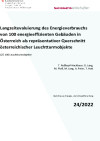
Erfassung, Auswertung und Analyse von Energieverbrauchsdaten von 100 energieeffizienten Gebäuden in Österreich über eine Betriebszeit von 3 bis 25 Jahren als repräsentativer Querschnitt der österreichischen Leuchtturmobjekte. Differenzierung nach Gebäudetypen, Energieträger und Ermittlung der realen Treibhausgas-Emissionen. Vergleich der gemessenen Verbräuche zu Benchmark-Werten.
Schriftenreihe
24/2022
T. Roßkopf-Nachbaur, G. Lang, M. Ploß, M. Lang, A. Peter, T. Hatt
Herausgeber: BMK
Deutsch, 143 Seiten
Downloads zur Publikation
Energiemosaik Austria - Österreichweite Modellierung und webbasierte Visualisierung von Energieverbrauch und CO2-Emissionen auf Gemeindeebene
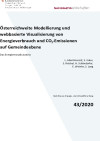
Inhalt des Projektes ist eine alle Nutzungs- und Mobilitätsarten umfassende Modellierung und webbasierte Visualisierung von Energieverbrauch und Treibhausgasemissionen aller österreichischen Gemeinden. Die Ergebnisse können in zahlreiche energie- und klimarelevante Handlungsfelder integriert und für die Sensibilisierung von Entscheidungsträgern und Öffentlichkeit genutzt werden.
Schriftenreihe
43/2020
L. Abart-Heriszt, S. Erker, S. Reichel, H. Schöndorfer, E. Weinke, S. Lang
Herausgeber: BMK
Deutsch, 56 Seiten
Downloads zur Publikation
Urban district heating extended - Flexibilisierung und Dekarbonisierung urbaner Fernwärmesysteme
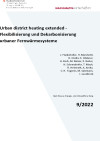
Entwicklung innovativer urbaner Fernwärmeversorgungssysteme durch Integration von Langzeitwärmespeicher, (Groß-)Wärmepumpe, solarthermische Großanlage, Abwärme und simulationstechnischer Analyse und Bewertung. Das Ergebnis dient als Vorbild für Technologieauswahl und Einsatzreihenfolge neuer urbaner Fernwärmeversorgungsgebiete.
Schriftenreihe
9/2022
J. Fladenhofer, H. Marchetti, H. Ondra, E. Höckner, H. Koch, M. Moser, P. Reiter, H. Schranzhofer, T. Mach, R. Heimrath, A. Arnitz, C. R. Tugores, M. Salzmann, I. Leusbrock
Herausgeber: BMK
Deutsch, 176 Seiten
Downloads zur Publikation
Green SandboxBuilder: Regulatory Sandboxes im Bereich des nachhaltigen Bauens und Sanierens
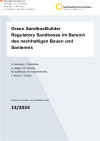
Im Projekt "Green SandboxBuilder" wurde erstmals in Österreich der Bedarf an Regulatory Sandboxes für ökologisch nachhaltige und klimawirksame Vorhaben im Baubereich systematisch erhoben. Die Umsetzung von Regulatory Sandboxes im österreichischen Bausektor kann dazu beitragen, die Einführung von technologischen, prozessualen und sozialen Innovationen entscheidend zu beschleunigen und somit die Nachhaltigkeitsziele zu erreichen.
Schriftenreihe
13/2024
G. Leimüller, J. Rohrhofer, A. Gerger, Ch. Schranz, M. Aichholzer, M. Schachenhofer, C. Benes, F. Ozclon
Herausgeber: BMK
Deutsch, 71 Seiten
Downloads zur Publikation
BIMaterial Process Design for Material Building Pass
Building Information Modelling supported compilation of a Material Building Pass; as a qualitative and quantitative documentation of the material composition of, and the material distribution within, a building structure. This project is a central milestone towards standardized, BIM-generated building material passes.
Digitale Transformation der österreichischen Bauwirtschaft und Auswirkungen auf die Erwerbstätigen
In einer Trendanalyse werden wahrscheinliche Auswirkungen der digitalen Transformation in der österreichischen Bauwirtschaft auf den Branchen-Arbeitsmarkt untersucht. Auf Basis von Feedback von BranchenexpertInnen wird für die kommenden fünf bis zehn Jahre analysiert, für welche Berufsgruppen digitalisierungsinduzierte Effekte eher zu einer steigenden vs. sinkenden Arbeitskraftnachfrage führen.
SPRINKLE - Smart City Governanceprozesse in kleinen und mittleren Städten
Das Projekt "SPRINKLE" führte eine umfassende Untersuchung der Ansätze für die Koordination und Steuerung einer Smart City Entwicklung in kleineren und mittleren Städten durch. Dabei wurden im Rahmen von Fallstudien für ausgewählte energiebezogene städtische Handlungsfelder sowohl relevante rechtlich-institutionelle Rahmenbedingungen als auch Governance-Prozesse betrachtet.
Sondierung für die Entwicklung von moosbewachsenen Gebäudefassadenpaneelen (BE-MO-FA)
Sondierung für die Entwicklung von moosbewachsenen Fassadenpaneelen durch Auswahl und Erprobung von geeigneten Moosarten, neuen Feuchtespeicher- und Haftsubstraten, Materialien für Tragpaneele und hochbautechnischen Konstruktionsdetails Für ganzjährig grüne, dauerhafte, pflegeextensive und kostengünstige Gebäudefassaden.
PRoBateS - Potenziale im Raumordnungs- und Baurecht für energetisch nachhaltige Stadtstrukturen
Das Projekt hat das Ziel, Hemmnisse und Potenziale für energiepolitische Maßnahmen im Raumordnungs- und Baurecht zu analysieren und konkrete Handlungsempfehlungen für energetisch nachhaltige Stadtstrukturen zu erarbeiten. Das Projekt verknüpft dazu eine fundierte rechtswissenschaftliche Analyse mit einer raumstrukturellen und quantitativen Wirkungsabschätzung.
SeasonalGridStorage - Innovative seasonale thermal storages for urban district heating grids
Sensible storages, which are currently used in district heating networks for seasonal storage of excess heat (e.g. from solar thermal or industrial waste heat), exhibit high space demand, investment costs and heat losses. Within this project, concepts for using innovative storage technologies, e.g. thermochemical storages (TCS) having high heat densities and enabling pressure- and lossless storage, were developed and analyzed on a technological, economic and ecological basis. Additionally, the regulatory framework has been evaluated.
StromBIZ - Demonstrationsprojekte: Geschäftsmodelle dezentrale Stromerzeugung und Distribution
Ein "Tipping Point" bei der Umsetzung der Energiewende sind Geschäftsmodelle zur Vor-Ort-Nutzung von regenerativ erzeugtem Strom. Es wurden anhand von mehreren Demonstrations-PV-Anlagen auf Wohn- und Nichtwohngebäuden neue Geschäftsmodelle der dezentralen Stromerzeugung und Distribution entwickelt, implementiert, getestet und schließlich kommuniziert.
BIMaterial Prozess-Design für einen BIM-basierten, materiellen Gebäudepass
Generierung des materiellen Gebäudepass (MGP) - Dokumentation der materiellen Zusammensetzung eines Bauwerkes, die quantitative und qualitative Auskunft über die relevanten Rohstoffe in einem Bauwerk gibt. Als Information und Datenbasis für das MGP wurde die Building Information Modelling Methode und ein digitales Gebäudemodell verwendet. Als Ergebnis wurde ein Pflichtenheft für eine BIM-basierte MGP App geschaffen werden.
SeasonalGridStorage - Innovative saisonale Wärmespeicher für urbane Wärmenetze
Die derzeit in Fernwärmenetzen eingesetzten sensiblen Speicher zur saisonalen Speicherung von überschüssiger Wärme (z.B. Solarthermie, industrielle Abwärme) weisen einen hohen Raumbedarf sowie hohe Investitionskosten und Wärmeverluste auf. In diesem Projekt wurden Konzepte zur Nutzung innovativer Speichertechnologien, wie thermochemische Speicher (TCS) mit hohen Energiedichten und der Möglichkeit der druck- und verlustlosen Speicherung entwickelt und mit Hilfe von Simulationsrechnungen in technischer, ökologischer und wirtschaftlicher Hinsicht untersucht sowie rechtliche Randbedingungen bewertet.
BIM4BEMS - Building Information Modeling for Building Energy Management Systems
BIM4BEMS untersucht Anwendungsfälle, die den Nutzen eines BIM-Modells in Kombination mit Energiemanagementsystemen (BEMS) im Betrieb darstellen, die die Verbindung zwischen BIM und Gebäudeleittechnik (BMS) erlauben, und somit zu verbessertem Reporting und Erkennung von Ineffizienzen im bestehenden Gebäudebetrieb führen.
